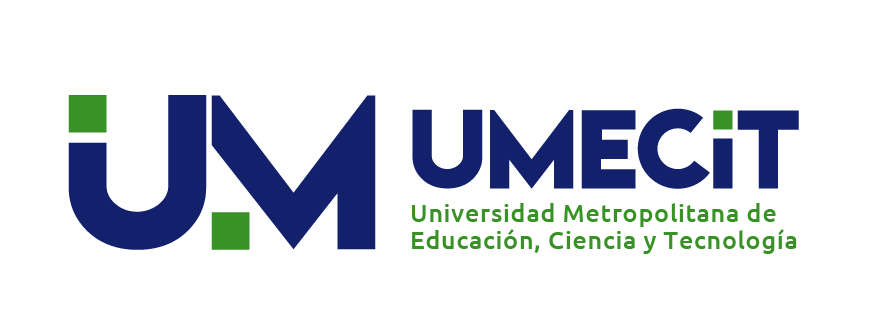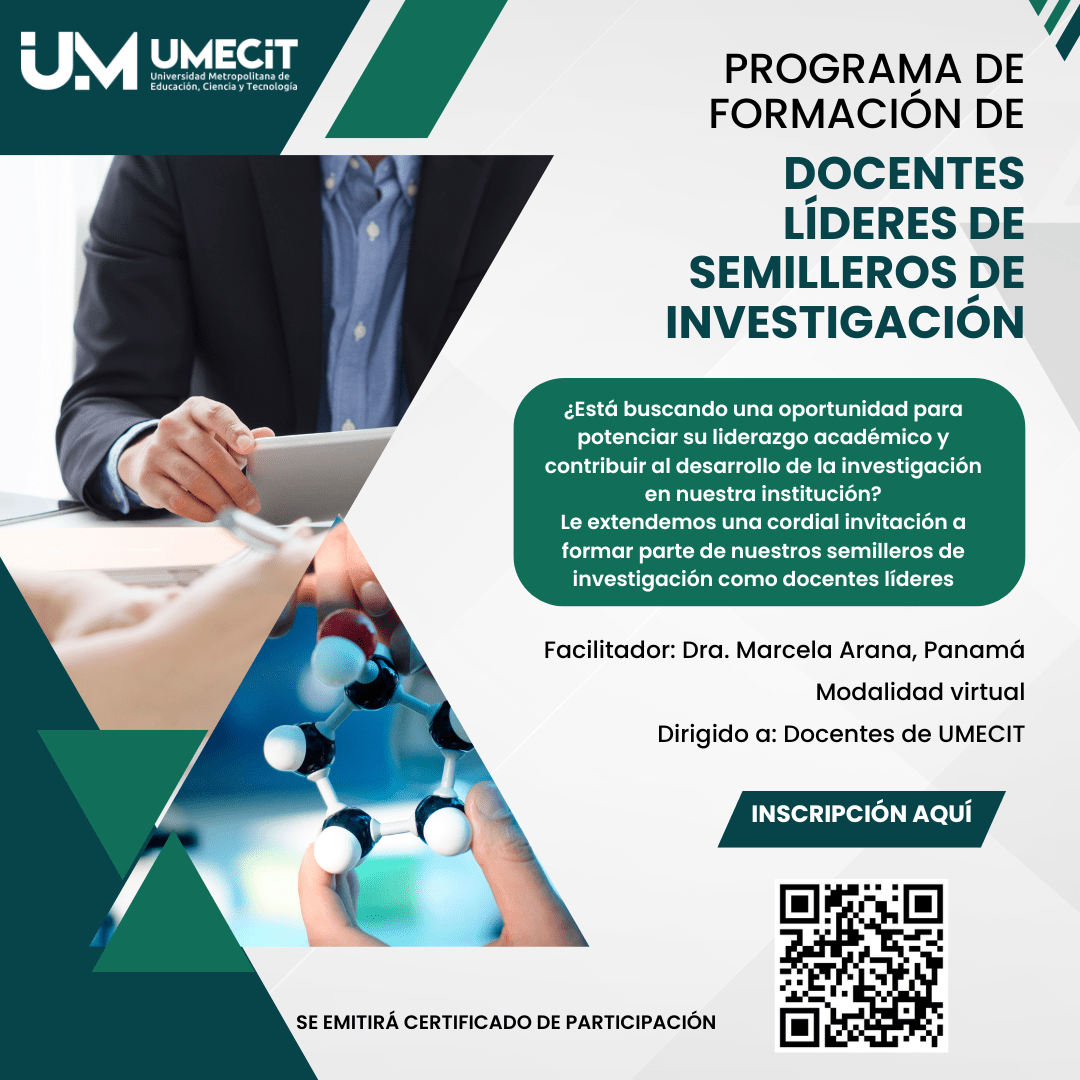Join our Training Program for Teacher Leaders of Research Seedbeds at UMECIT
Are you looking for an opportunity to enhance your academic leadership and contribute to the development of research at our institution? Then this invitation is for you!
We extend a cordial invitation to you to be part of our research hotbeds as leading teachers. Our program offers a valuable training opportunity to strengthen your skills as a research mentor, providing you with the competencies necessary to guide students with quality and excellence.
By joining, you will have the opportunity to inspire and guide the next generation of researchers, sharing your experience and knowledge effectively in a collaborative and enriching environment that, without a doubt, strengthens our Neocyberhumanist curricular educational model.
Program Details:
Facilitator: Dr. Marcela Arana, Panama
Modality: Virtual
Addressed to: UMECIT Undergraduate Students
Certification: Certificate of participation will be issued
Relevance of the Program and Added Value for You- By participating in this program, you can expect a number of significant benefits, including:
Strengthening Specific Skills: You will develop key skills in mentoring research projects, seedbed management, and leading multidisciplinary teams.
Institutional Recognition: Your participation will be recognized by the institution as a commitment to academic excellence and the promotion of research, which can translate into opportunities for professional growth and recognition within the university community.
Access to Resources and Networks: You will have access to a wide range of institutional resources and collaborative networks, allowing you to expand your academic horizons and establish valuable connections with other professionals in your field.
Impact on Student Development: By improving your skills as a research mentor, you will be able to positively influence the academic and professional development of your students, fostering a culture of research and excellence at our institution.
Continuous Support and Accompaniment: Our team will be available to provide you with ongoing support and guidance throughout the program, ensuring you have the tools and support necessary to achieve your professional development goals.
Content and Structure of the Program:
The program consists of five modules, each designed to address specific aspects related to mentoring research projects. The sessions will be interactive and practical, promoting collaborative learning and the exchange of experiences between colleagues.
We hope to have your participation in this important effort to promote a culture of research and academic excellence at UMECIT!
Registration Link: Register here before April 27, 2024!
For more information and questions, contact us at investigacion.salud@umecit.edu.pa.
CONTENT AND STRUCTURE OF THE PROGRAM
Module 1: Research Seedbeds: Concept, Objectives and Theoretical Description
Date: Friday, May 3, 2024
Time: 6:00 pm
Objective: Introduce participants to what research hotbeds are, their main objectives and provide a clear understanding of their importance in the academic and scientific field.
Theoretical Description:
Participants will be explained what research hotbeds are and it will be explained in depth that they are groups made up of students and teachers interested in developing research activities in specific areas of knowledge. These spaces seek to foster interest in research from the early stages of academic training, promoting the development of investigative skills, critical thinking and the generation of knowledge.
Likewise, the main objectives of the Research Seedbeds will be worked on, which are:
Promote Investigative Culture: The seedbeds seek to encourage a culture of research among students, promoting intellectual curiosity and the exploration of new ideas and approaches in different fields of knowledge.
Develop Investigative Skills: Through participation in research projects, students have the opportunity to develop skills such as formulating hypotheses, designing methodologies, collecting and analyzing data, as well as writing and presenting results.
Contribute to the Advancement of Knowledge: The research hotbeds aim to generate new knowledge in specific areas, contributing to the scientific and technological development of society.
Promote Interdisciplinarity: By bringing together students and teachers from different disciplines, the seedbeds encourage collaboration and the exchange of ideas between different areas of knowledge, thus enriching research projects.
During this activity, a clear and concise definition of what research hotbeds are will be provided, highlighting their importance in the academic and scientific context. The main objectives of these spaces will be addressed, emphasizing their role in the comprehensive training of students and in the generation of new knowledge.
In addition, specific examples of research projects developed in seedbeds will be discussed, highlighting their contributions to the advancement of knowledge in different areas. Participants will be encouraged to share their personal experiences in research hotbeds, as well as their expectations and motivations for participating in these types of activities.
Module 2: Introduction to Leadership in Research Seedbeds
Date: Friday, May 10, 2024
Time: 6:00 pm
Aim: The aim is to familiarize participants with the fundamentals of leadership applied to research hotbeds, providing a clear understanding of its importance and role in the academic development of students.
Theoretical Description:
In this activity, the key concepts of leadership and their relevance in the context of research hotbeds will be delved into. The session will begin by exploring a variety of leadership styles, from autocratic to transformational approaches, highlighting how each can influence the functioning and success of a seedbed. Additionally, practical examples of effective leaders will be analyzed and the skills and competencies necessary to successfully lead a research group will be discussed.
Likewise, the importance of ethical leadership and the creation of an inclusive and collaborative environment in the seedbed will be addressed. Strategies will be presented to encourage the participation of all team members, promoting a climate of respect and mutual trust that facilitates the development of successful projects.
In summary, this session will provide participants with a solid foundation in leadership theory applied to research hotbeds, preparing them to take on an active and effective role as leaders in their own educational contexts.
Module 3: Planning and Design of Research Seedbeds
Date: Friday, May 24, 2024
Time: 6:00 p.m.
Aim: The aim is to train teachers in strategic planning and the effective design of research incubators, with the aim of establishing a clear and coherent structure for the development of research projects.
Theoretical Description:
This session will delve into the practical aspects of creating and operating a research hotbed. Each stage of the planning process will be explored in detail, beginning with the identification of clear objectives and the selection of relevant and meaningful research topics. The importance of student participation in decision making and how this can increase their commitment and motivation will be discussed.
In addition, strategies will be analyzed to design a detailed work plan, assign roles and responsibilities equitably, and establish effective mechanisms for monitoring and evaluating project progress. Practical examples of tools and resources will be provided that can help teachers implement these strategies in their own nurseries.
In summary, this session will equip participants with the knowledge and skills necessary to plan and design successful research hotbeds, inspiring and empowering students to carry out high-quality and relevant research projects.
Module 4: Motivation and Guidance Strategies for Students
Date: Friday, May 31, 2024
Time: 6:00 p.m.
Objective: The aim is to provide teachers with practical tools to motivate and guide students in their research projects, promoting their commitment and autonomy.
Theoretical Description:
In this session, different strategies and approaches will be explored to motivate students to actively participate in research projects and to provide them with the support and guidance necessary to achieve their academic and professional goals. We will begin by examining motivation theories applied to the educational context and how they can influence the behavior and performance of students in research projects.
Additionally, practical strategies will be explored to provide individualized guidance to students, identifying their strengths and areas for improvement, and offering specific resources and tools to support their academic and professional development. Techniques will also be discussed to encourage self-assessment and self-directed learning, promoting autonomy and responsibility in the research process.
In summary, this session will provide participants with a variety of practical tools and strategies to motivate and guide students in their research projects, helping them reach their full potential as researchers and practitioners.
Module 5: Evaluation and Monitoring of Research Projects
Date: Friday, June 7, 2024
Time: 6:00 pm
Objective: The aim is to train teachers in the effective evaluation and monitoring of students' research projects, guaranteeing the quality and rigor of the results obtained.
Theoretical Description:
In this session, different methods and approaches for evaluating and monitoring research projects will be explored, ensuring that students receive constructive and meaningful feedback on their work. Fundamental evaluation criteria in research, such as topic relevance, methodological rigor, and originality of results, will be discussed, and tools and techniques that can help teachers objectively and equitably evaluate student work will be explored. .
Additionally, strategies will be discussed to provide effective feedback to students, promoting critical reflection and continuous learning. Techniques will also be explored to continually monitor project progress, identifying potential obstacles and offering practical solutions to overcome them.
In summary, this session will provide participants with the tools and skills necessary to evaluate and monitor research projects effectively, ensuring that students achieve standards of academic and professional excellence in their research work.
CLOSING SESSION: Friday, June 14, 2024
Time: 6:00 p.m.
PROGRAM METHODOLOGY
One synchronous session per module
CERTIFICATION WILL BE GRANTED upon taking and PASSING the five (5) modules. Duration: 40 academic hours, distributed in: Synchronous hours: 24 hours. Asynchronous hours: 16 hours
The synchronous sessions will take place on Fridays at 6:00 pm through the Meet platform
Interactive, hands-on sessions designed to promote collaborative learning and sharing of experiences among colleagues
Registration link:
https://forms.gle/fd5GZ4gQTUtUaiGF7
IMPORTANT NOTE: IT HAS NO COST. IT IS AN EXCLUSIVE PROGRAM FOR OUR LEADING TEACHERS FROM RESEARCH SEEDS.
Doubts and concerns to the email: investigacion.salud@umecit.edu.pa
Facilitator: Dr. Marcela Arana. Bachelor's Degree in Psychology, Specialist in Cognitive Therapy, Master's Degree in Neuropsychology, Doctor in Psychology with orientation in Cognitive Neurosciences, Specialist in Organizational Psychology.


